University Business Law: Corporate Social Responsibility Analysis
VerifiedAdded on 2020/04/21
|11
|2285
|202
Report
AI Summary
This report provides a detailed analysis of Corporate Social Responsibility (CSR), defining it as the ethical, legal, and economic expectations society holds for organizations. It explores the concept of the Limited Liability Company and contrasts corporations with other business partnerships, detailing different types and the evolution of the corporation. The report delves into corporate moral agency, including corporations as legal persons and their decision-making power. It further examines Edward Freeman's Stakeholder Theory, contrasting it with arguments against CSR, such as the Invisible-Hand Argument, the Let-Government-Do-It Argument, the Inept-Custodian Argument, and the Materialization of Society Argument. The report concludes by highlighting the importance of CSR and the broader view of modern business corporations.
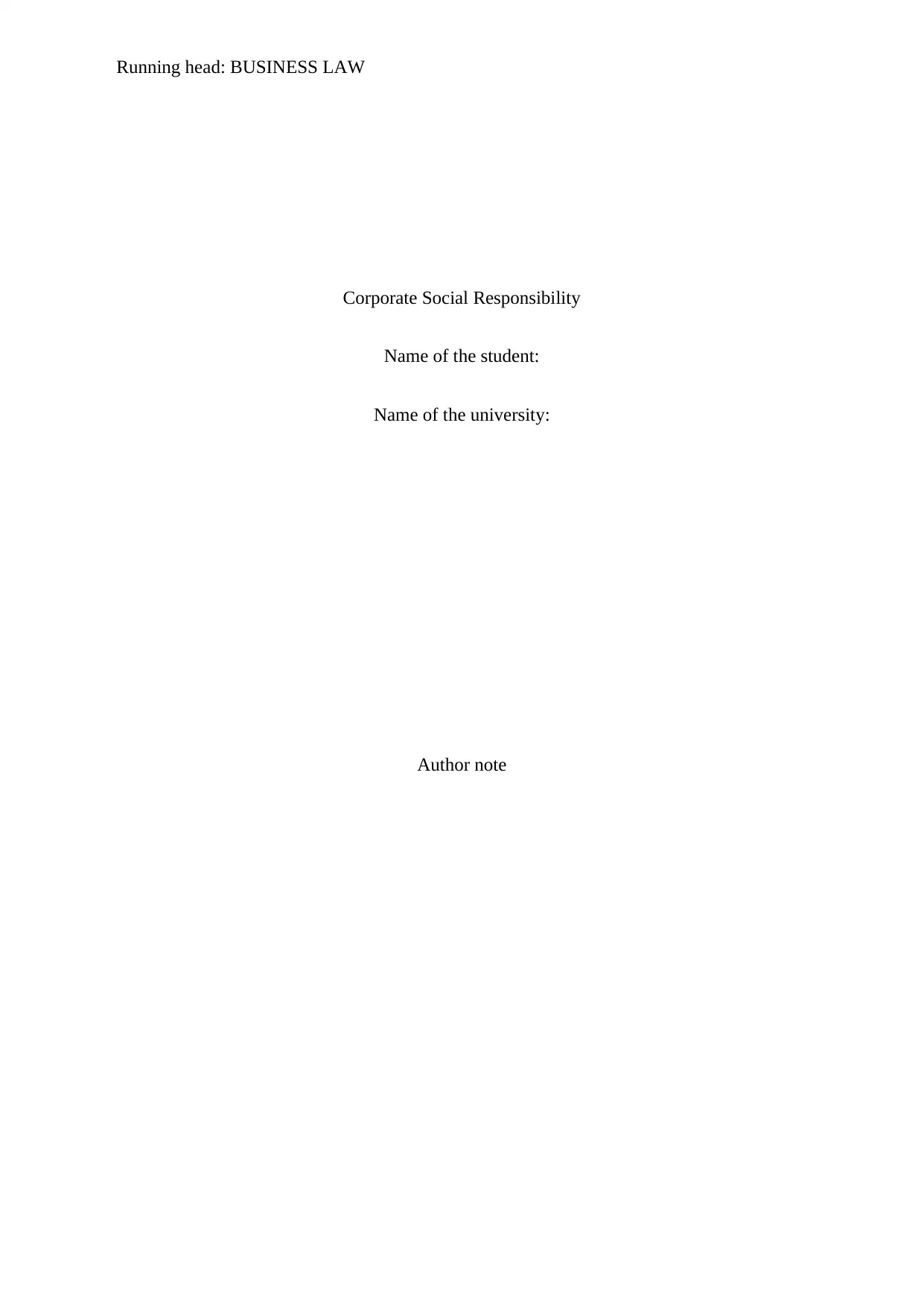
Running head: BUSINESS LAW
Corporate Social Responsibility
Name of the student:
Name of the university:
Author note
Corporate Social Responsibility
Name of the student:
Name of the university:
Author note
Paraphrase This Document
Need a fresh take? Get an instant paraphrase of this document with our AI Paraphraser
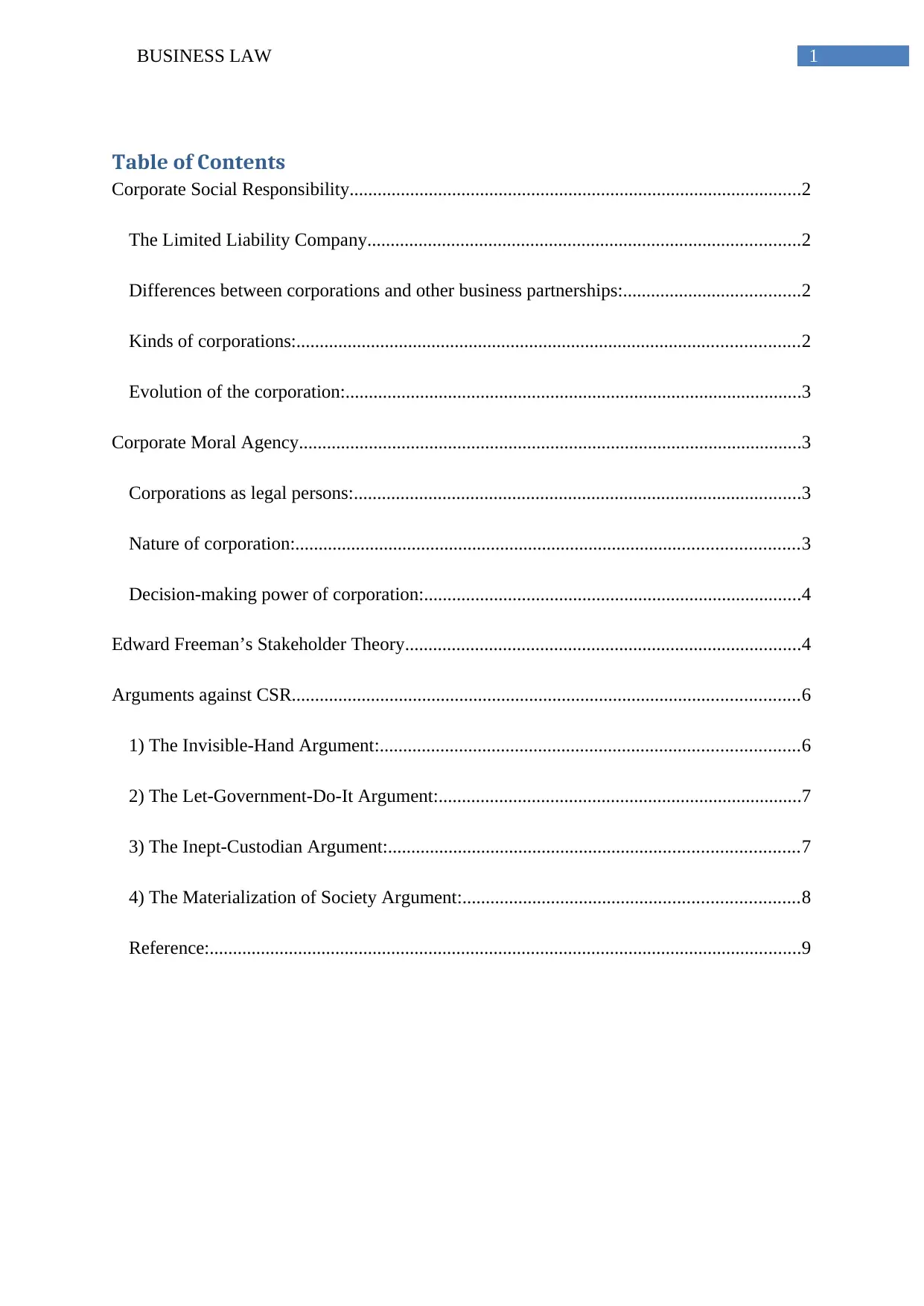
1BUSINESS LAW
Table of Contents
Corporate Social Responsibility.................................................................................................2
The Limited Liability Company.............................................................................................2
Differences between corporations and other business partnerships:......................................2
Kinds of corporations:............................................................................................................2
Evolution of the corporation:..................................................................................................3
Corporate Moral Agency............................................................................................................3
Corporations as legal persons:................................................................................................3
Nature of corporation:............................................................................................................3
Decision-making power of corporation:.................................................................................4
Edward Freeman’s Stakeholder Theory.....................................................................................4
Arguments against CSR.............................................................................................................6
1) The Invisible-Hand Argument:..........................................................................................6
2) The Let-Government-Do-It Argument:..............................................................................7
3) The Inept-Custodian Argument:........................................................................................7
4) The Materialization of Society Argument:........................................................................8
Reference:...............................................................................................................................9
Table of Contents
Corporate Social Responsibility.................................................................................................2
The Limited Liability Company.............................................................................................2
Differences between corporations and other business partnerships:......................................2
Kinds of corporations:............................................................................................................2
Evolution of the corporation:..................................................................................................3
Corporate Moral Agency............................................................................................................3
Corporations as legal persons:................................................................................................3
Nature of corporation:............................................................................................................3
Decision-making power of corporation:.................................................................................4
Edward Freeman’s Stakeholder Theory.....................................................................................4
Arguments against CSR.............................................................................................................6
1) The Invisible-Hand Argument:..........................................................................................6
2) The Let-Government-Do-It Argument:..............................................................................7
3) The Inept-Custodian Argument:........................................................................................7
4) The Materialization of Society Argument:........................................................................8
Reference:...............................................................................................................................9
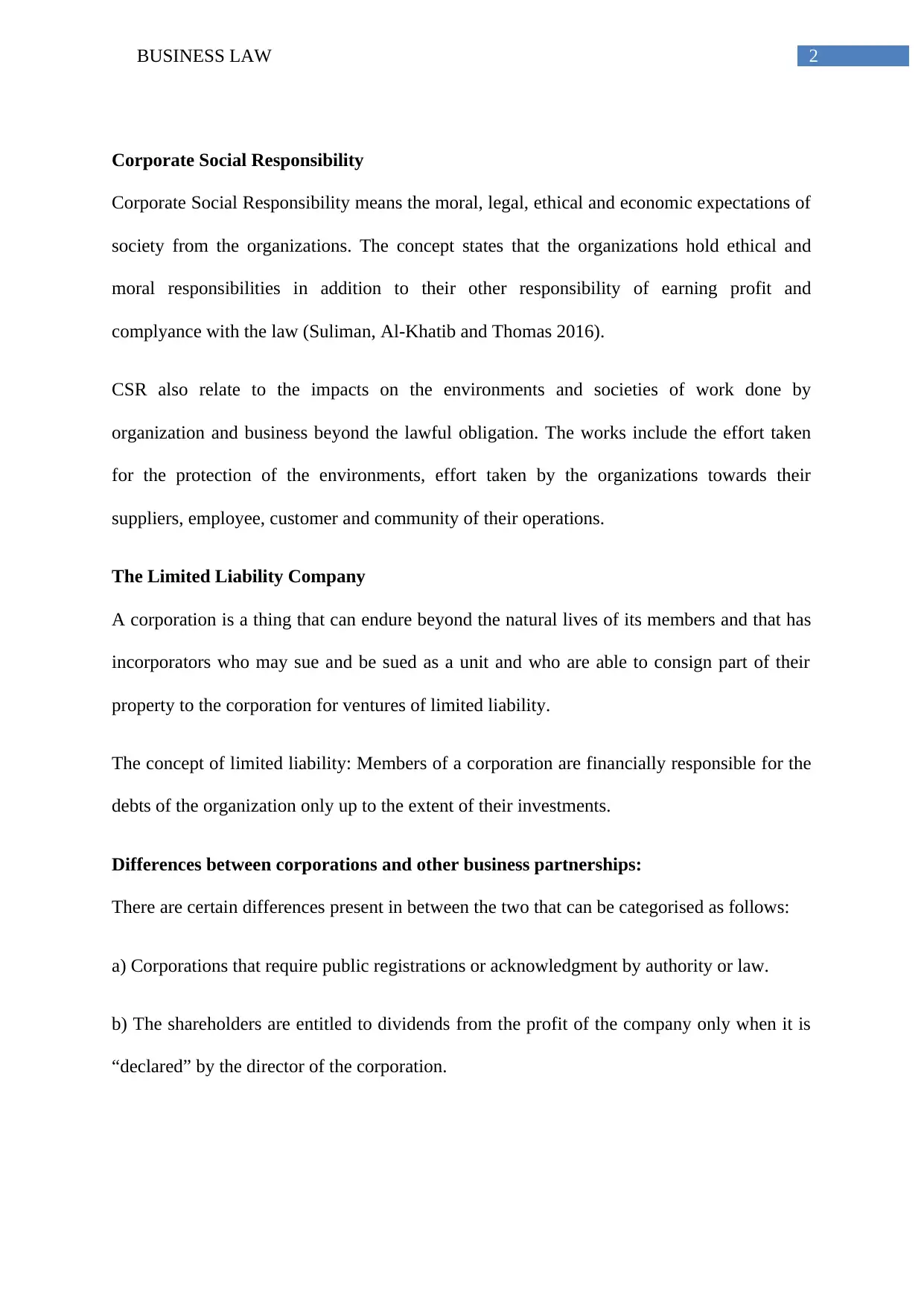
2BUSINESS LAW
Corporate Social Responsibility
Corporate Social Responsibility means the moral, legal, ethical and economic expectations of
society from the organizations. The concept states that the organizations hold ethical and
moral responsibilities in addition to their other responsibility of earning profit and
complyance with the law (Suliman, Al-Khatib and Thomas 2016).
CSR also relate to the impacts on the environments and societies of work done by
organization and business beyond the lawful obligation. The works include the effort taken
for the protection of the environments, effort taken by the organizations towards their
suppliers, employee, customer and community of their operations.
The Limited Liability Company
A corporation is a thing that can endure beyond the natural lives of its members and that has
incorporators who may sue and be sued as a unit and who are able to consign part of their
property to the corporation for ventures of limited liability.
The concept of limited liability: Members of a corporation are financially responsible for the
debts of the organization only up to the extent of their investments.
Differences between corporations and other business partnerships:
There are certain differences present in between the two that can be categorised as follows:
a) Corporations that require public registrations or acknowledgment by authority or law.
b) The shareholders are entitled to dividends from the profit of the company only when it is
“declared” by the director of the corporation.
Corporate Social Responsibility
Corporate Social Responsibility means the moral, legal, ethical and economic expectations of
society from the organizations. The concept states that the organizations hold ethical and
moral responsibilities in addition to their other responsibility of earning profit and
complyance with the law (Suliman, Al-Khatib and Thomas 2016).
CSR also relate to the impacts on the environments and societies of work done by
organization and business beyond the lawful obligation. The works include the effort taken
for the protection of the environments, effort taken by the organizations towards their
suppliers, employee, customer and community of their operations.
The Limited Liability Company
A corporation is a thing that can endure beyond the natural lives of its members and that has
incorporators who may sue and be sued as a unit and who are able to consign part of their
property to the corporation for ventures of limited liability.
The concept of limited liability: Members of a corporation are financially responsible for the
debts of the organization only up to the extent of their investments.
Differences between corporations and other business partnerships:
There are certain differences present in between the two that can be categorised as follows:
a) Corporations that require public registrations or acknowledgment by authority or law.
b) The shareholders are entitled to dividends from the profit of the company only when it is
“declared” by the director of the corporation.
⊘ This is a preview!⊘
Do you want full access?
Subscribe today to unlock all pages.

Trusted by 1+ million students worldwide
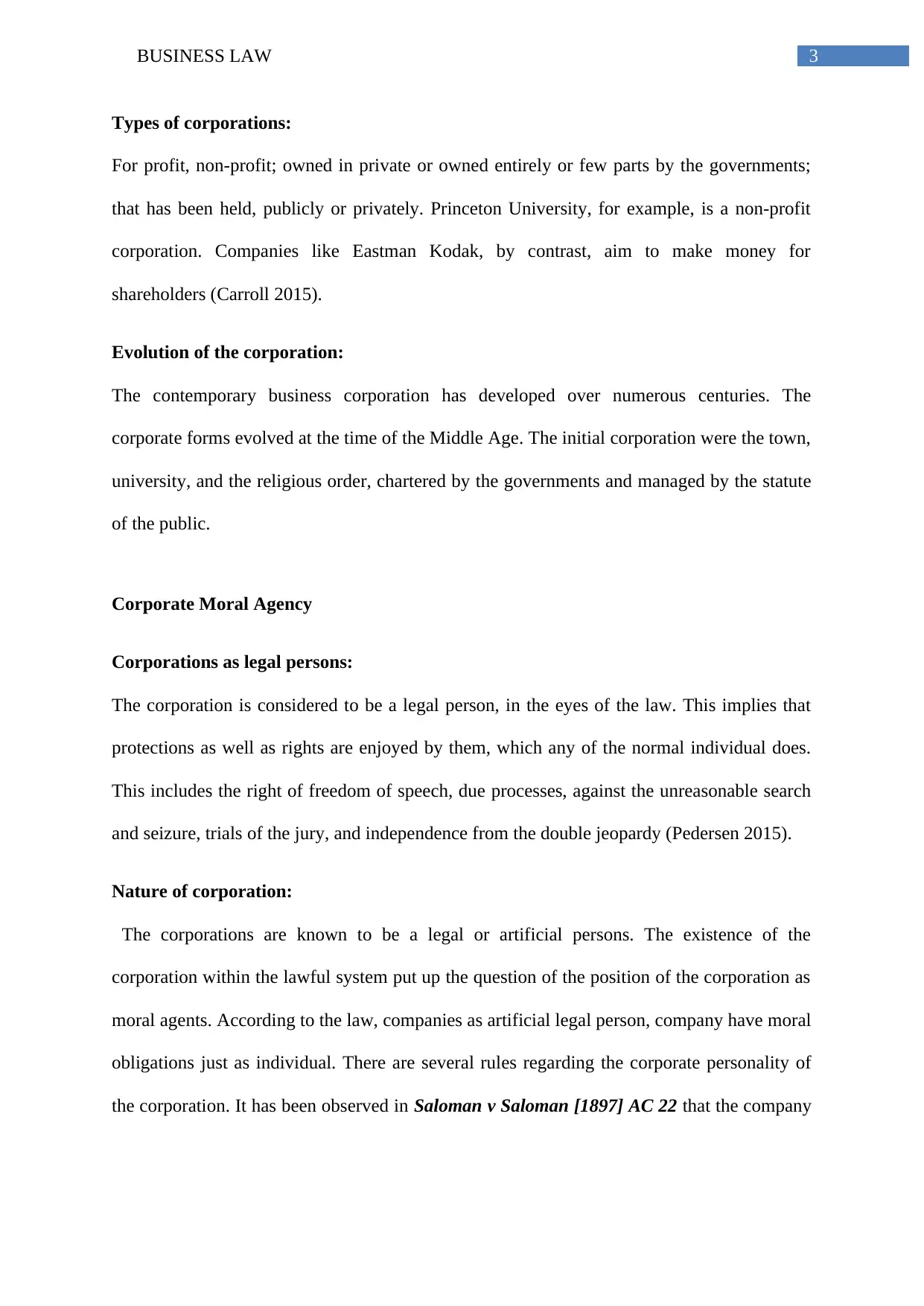
3BUSINESS LAW
Types of corporations:
For profit, non-profit; owned in private or owned entirely or few parts by the governments;
that has been held, publicly or privately. Princeton University, for example, is a non-profit
corporation. Companies like Eastman Kodak, by contrast, aim to make money for
shareholders (Carroll 2015).
Evolution of the corporation:
The contemporary business corporation has developed over numerous centuries. The
corporate forms evolved at the time of the Middle Age. The initial corporation were the town,
university, and the religious order, chartered by the governments and managed by the statute
of the public.
Corporate Moral Agency
Corporations as legal persons:
The corporation is considered to be a legal person, in the eyes of the law. This implies that
protections as well as rights are enjoyed by them, which any of the normal individual does.
This includes the right of freedom of speech, due processes, against the unreasonable search
and seizure, trials of the jury, and independence from the double jeopardy (Pedersen 2015).
Nature of corporation:
The corporations are known to be a legal or artificial persons. The existence of the
corporation within the lawful system put up the question of the position of the corporation as
moral agents. According to the law, companies as artificial legal person, company have moral
obligations just as individual. There are several rules regarding the corporate personality of
the corporation. It has been observed in Saloman v Saloman [1897] AC 22 that the company
Types of corporations:
For profit, non-profit; owned in private or owned entirely or few parts by the governments;
that has been held, publicly or privately. Princeton University, for example, is a non-profit
corporation. Companies like Eastman Kodak, by contrast, aim to make money for
shareholders (Carroll 2015).
Evolution of the corporation:
The contemporary business corporation has developed over numerous centuries. The
corporate forms evolved at the time of the Middle Age. The initial corporation were the town,
university, and the religious order, chartered by the governments and managed by the statute
of the public.
Corporate Moral Agency
Corporations as legal persons:
The corporation is considered to be a legal person, in the eyes of the law. This implies that
protections as well as rights are enjoyed by them, which any of the normal individual does.
This includes the right of freedom of speech, due processes, against the unreasonable search
and seizure, trials of the jury, and independence from the double jeopardy (Pedersen 2015).
Nature of corporation:
The corporations are known to be a legal or artificial persons. The existence of the
corporation within the lawful system put up the question of the position of the corporation as
moral agents. According to the law, companies as artificial legal person, company have moral
obligations just as individual. There are several rules regarding the corporate personality of
the corporation. It has been observed in Saloman v Saloman [1897] AC 22 that the company
Paraphrase This Document
Need a fresh take? Get an instant paraphrase of this document with our AI Paraphraser
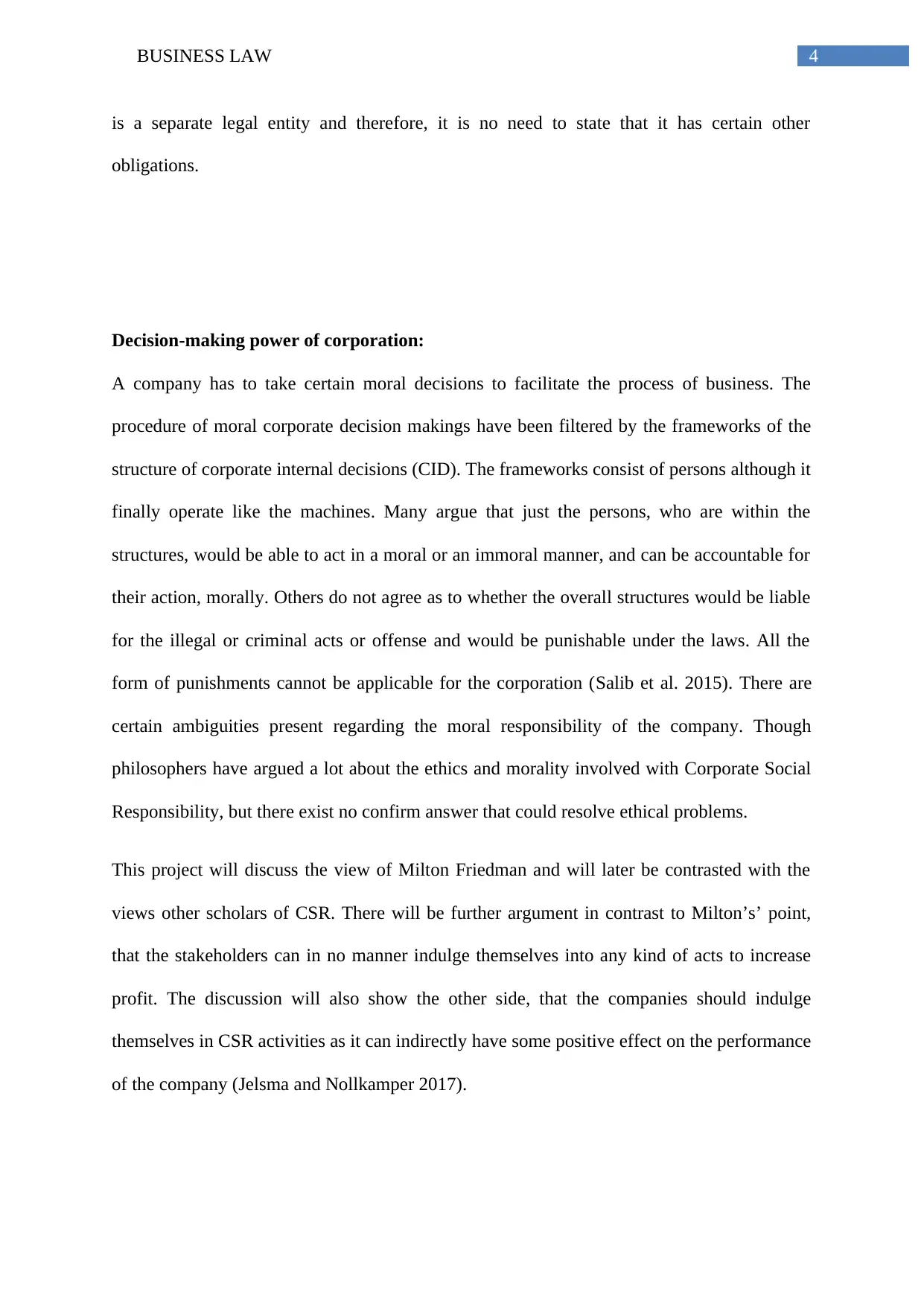
4BUSINESS LAW
is a separate legal entity and therefore, it is no need to state that it has certain other
obligations.
Decision-making power of corporation:
A company has to take certain moral decisions to facilitate the process of business. The
procedure of moral corporate decision makings have been filtered by the frameworks of the
structure of corporate internal decisions (CID). The frameworks consist of persons although it
finally operate like the machines. Many argue that just the persons, who are within the
structures, would be able to act in a moral or an immoral manner, and can be accountable for
their action, morally. Others do not agree as to whether the overall structures would be liable
for the illegal or criminal acts or offense and would be punishable under the laws. All the
form of punishments cannot be applicable for the corporation (Salib et al. 2015). There are
certain ambiguities present regarding the moral responsibility of the company. Though
philosophers have argued a lot about the ethics and morality involved with Corporate Social
Responsibility, but there exist no confirm answer that could resolve ethical problems.
This project will discuss the view of Milton Friedman and will later be contrasted with the
views other scholars of CSR. There will be further argument in contrast to Milton’s’ point,
that the stakeholders can in no manner indulge themselves into any kind of acts to increase
profit. The discussion will also show the other side, that the companies should indulge
themselves in CSR activities as it can indirectly have some positive effect on the performance
of the company (Jelsma and Nollkamper 2017).
is a separate legal entity and therefore, it is no need to state that it has certain other
obligations.
Decision-making power of corporation:
A company has to take certain moral decisions to facilitate the process of business. The
procedure of moral corporate decision makings have been filtered by the frameworks of the
structure of corporate internal decisions (CID). The frameworks consist of persons although it
finally operate like the machines. Many argue that just the persons, who are within the
structures, would be able to act in a moral or an immoral manner, and can be accountable for
their action, morally. Others do not agree as to whether the overall structures would be liable
for the illegal or criminal acts or offense and would be punishable under the laws. All the
form of punishments cannot be applicable for the corporation (Salib et al. 2015). There are
certain ambiguities present regarding the moral responsibility of the company. Though
philosophers have argued a lot about the ethics and morality involved with Corporate Social
Responsibility, but there exist no confirm answer that could resolve ethical problems.
This project will discuss the view of Milton Friedman and will later be contrasted with the
views other scholars of CSR. There will be further argument in contrast to Milton’s’ point,
that the stakeholders can in no manner indulge themselves into any kind of acts to increase
profit. The discussion will also show the other side, that the companies should indulge
themselves in CSR activities as it can indirectly have some positive effect on the performance
of the company (Jelsma and Nollkamper 2017).
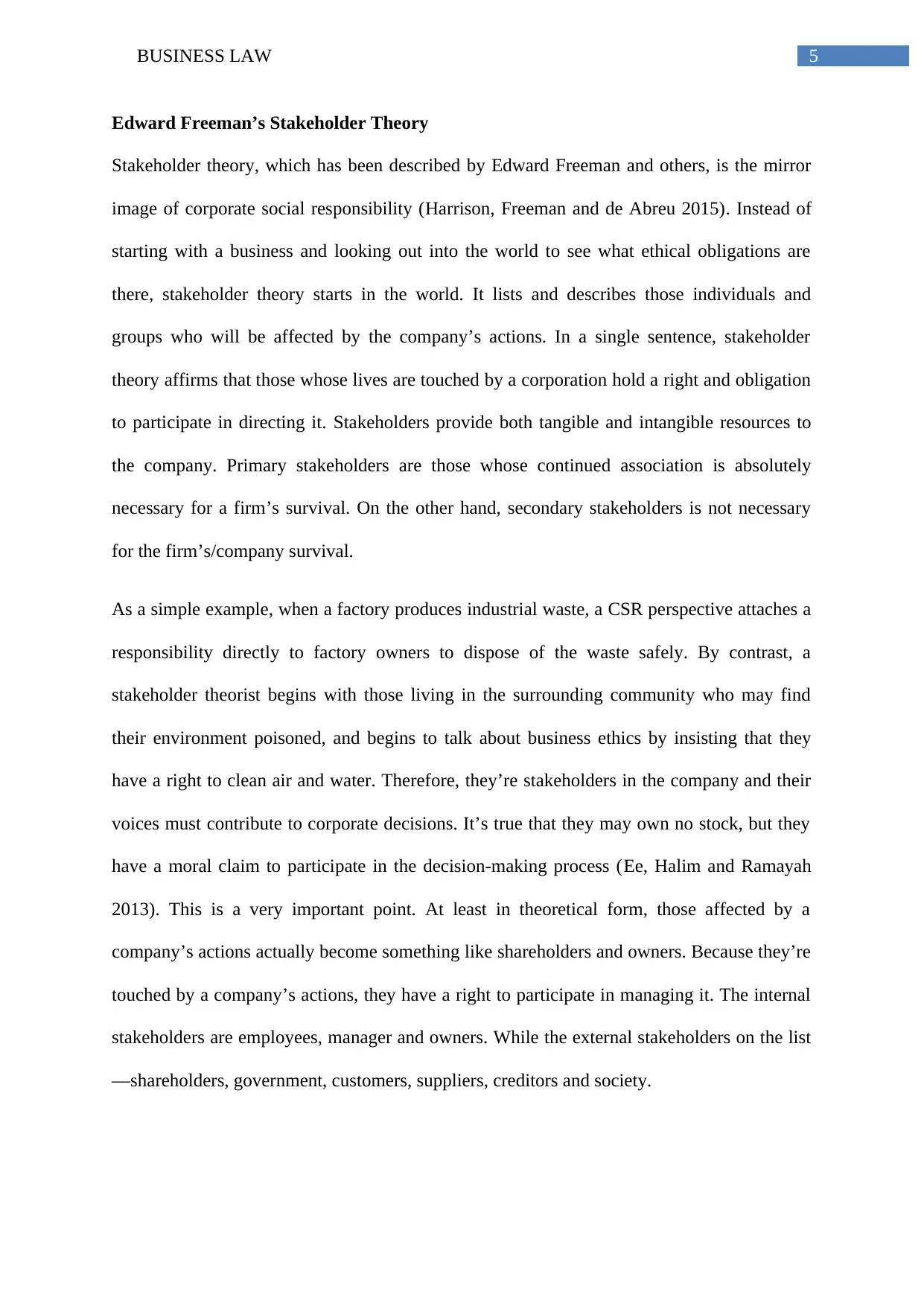
5BUSINESS LAW
Edward Freeman’s Stakeholder Theory
Stakeholder theory, which has been described by Edward Freeman and others, is the mirror
image of corporate social responsibility (Harrison, Freeman and de Abreu 2015). Instead of
starting with a business and looking out into the world to see what ethical obligations are
there, stakeholder theory starts in the world. It lists and describes those individuals and
groups who will be affected by the company’s actions. In a single sentence, stakeholder
theory affirms that those whose lives are touched by a corporation hold a right and obligation
to participate in directing it. Stakeholders provide both tangible and intangible resources to
the company. Primary stakeholders are those whose continued association is absolutely
necessary for a firm’s survival. On the other hand, secondary stakeholders is not necessary
for the firm’s/company survival.
As a simple example, when a factory produces industrial waste, a CSR perspective attaches a
responsibility directly to factory owners to dispose of the waste safely. By contrast, a
stakeholder theorist begins with those living in the surrounding community who may find
their environment poisoned, and begins to talk about business ethics by insisting that they
have a right to clean air and water. Therefore, they’re stakeholders in the company and their
voices must contribute to corporate decisions. It’s true that they may own no stock, but they
have a moral claim to participate in the decision-making process (Ee, Halim and Ramayah
2013). This is a very important point. At least in theoretical form, those affected by a
company’s actions actually become something like shareholders and owners. Because they’re
touched by a company’s actions, they have a right to participate in managing it. The internal
stakeholders are employees, manager and owners. While the external stakeholders on the list
—shareholders, government, customers, suppliers, creditors and society.
Edward Freeman’s Stakeholder Theory
Stakeholder theory, which has been described by Edward Freeman and others, is the mirror
image of corporate social responsibility (Harrison, Freeman and de Abreu 2015). Instead of
starting with a business and looking out into the world to see what ethical obligations are
there, stakeholder theory starts in the world. It lists and describes those individuals and
groups who will be affected by the company’s actions. In a single sentence, stakeholder
theory affirms that those whose lives are touched by a corporation hold a right and obligation
to participate in directing it. Stakeholders provide both tangible and intangible resources to
the company. Primary stakeholders are those whose continued association is absolutely
necessary for a firm’s survival. On the other hand, secondary stakeholders is not necessary
for the firm’s/company survival.
As a simple example, when a factory produces industrial waste, a CSR perspective attaches a
responsibility directly to factory owners to dispose of the waste safely. By contrast, a
stakeholder theorist begins with those living in the surrounding community who may find
their environment poisoned, and begins to talk about business ethics by insisting that they
have a right to clean air and water. Therefore, they’re stakeholders in the company and their
voices must contribute to corporate decisions. It’s true that they may own no stock, but they
have a moral claim to participate in the decision-making process (Ee, Halim and Ramayah
2013). This is a very important point. At least in theoretical form, those affected by a
company’s actions actually become something like shareholders and owners. Because they’re
touched by a company’s actions, they have a right to participate in managing it. The internal
stakeholders are employees, manager and owners. While the external stakeholders on the list
—shareholders, government, customers, suppliers, creditors and society.
⊘ This is a preview!⊘
Do you want full access?
Subscribe today to unlock all pages.

Trusted by 1+ million students worldwide
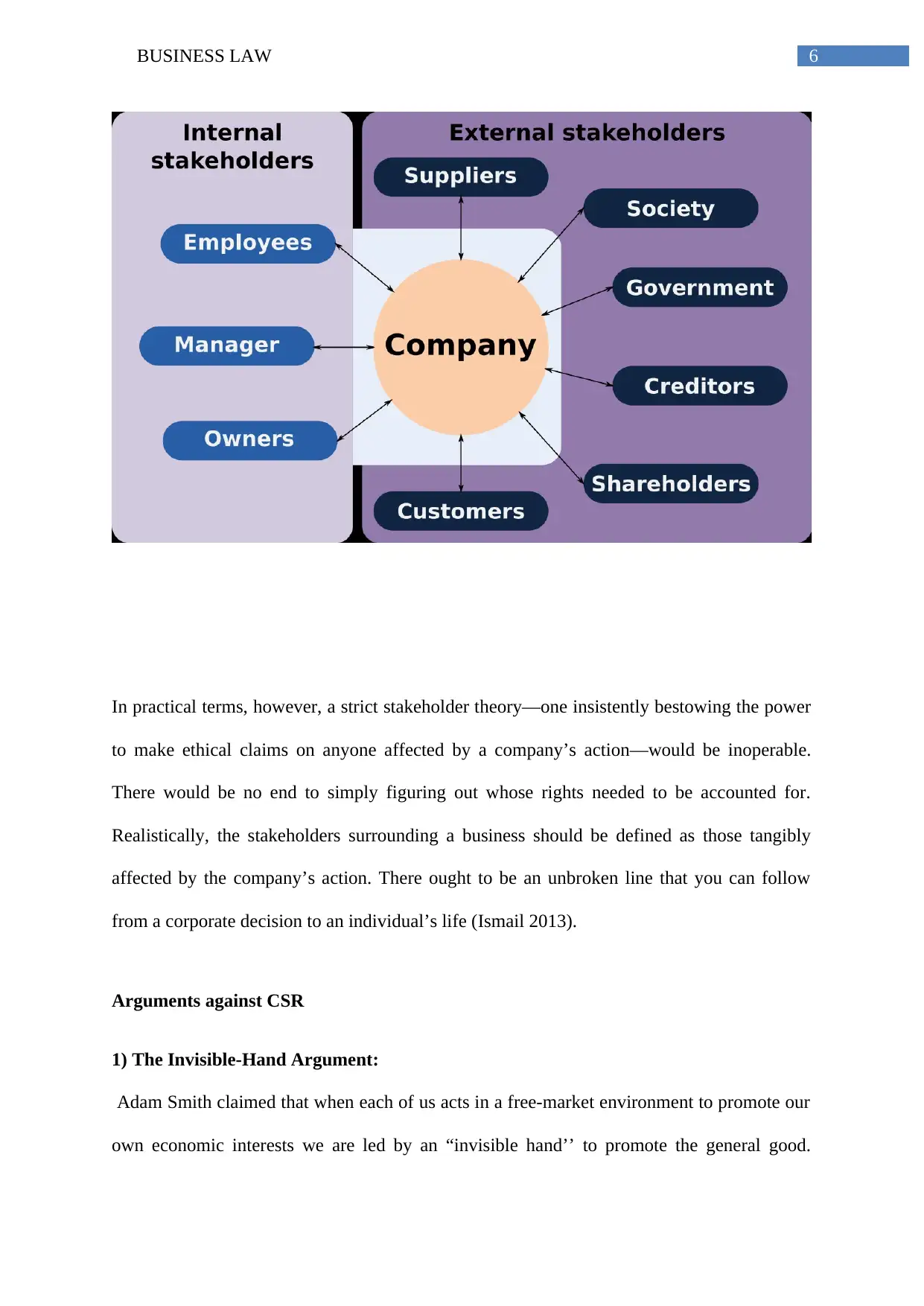
6BUSINESS LAW
In practical terms, however, a strict stakeholder theory—one insistently bestowing the power
to make ethical claims on anyone affected by a company’s action—would be inoperable.
There would be no end to simply figuring out whose rights needed to be accounted for.
Realistically, the stakeholders surrounding a business should be defined as those tangibly
affected by the company’s action. There ought to be an unbroken line that you can follow
from a corporate decision to an individual’s life (Ismail 2013).
Arguments against CSR
1) The Invisible-Hand Argument:
Adam Smith claimed that when each of us acts in a free-market environment to promote our
own economic interests we are led by an “invisible hand’’ to promote the general good.
In practical terms, however, a strict stakeholder theory—one insistently bestowing the power
to make ethical claims on anyone affected by a company’s action—would be inoperable.
There would be no end to simply figuring out whose rights needed to be accounted for.
Realistically, the stakeholders surrounding a business should be defined as those tangibly
affected by the company’s action. There ought to be an unbroken line that you can follow
from a corporate decision to an individual’s life (Ismail 2013).
Arguments against CSR
1) The Invisible-Hand Argument:
Adam Smith claimed that when each of us acts in a free-market environment to promote our
own economic interests we are led by an “invisible hand’’ to promote the general good.
Paraphrase This Document
Need a fresh take? Get an instant paraphrase of this document with our AI Paraphraser
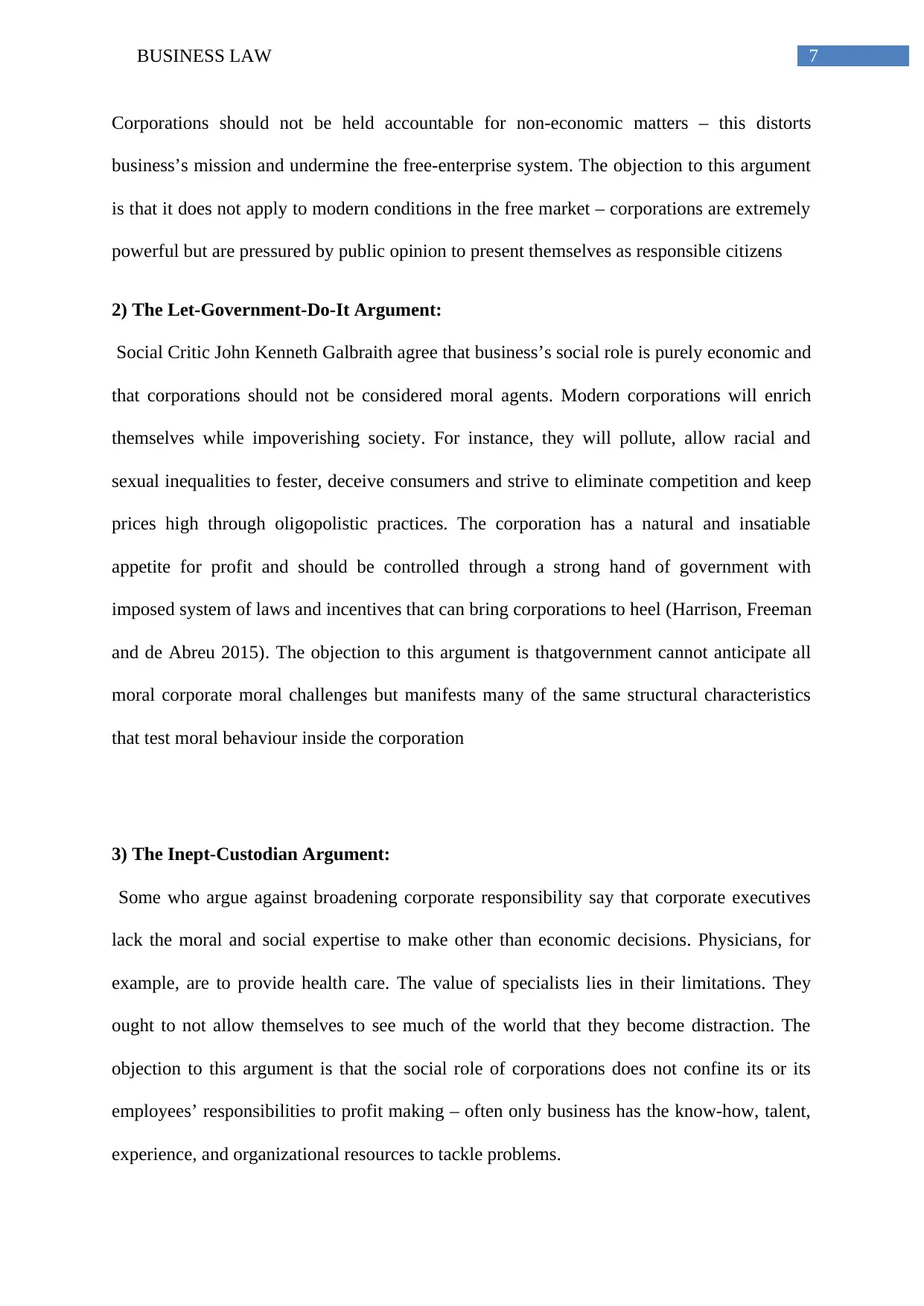
7BUSINESS LAW
Corporations should not be held accountable for non-economic matters – this distorts
business’s mission and undermine the free-enterprise system. The objection to this argument
is that it does not apply to modern conditions in the free market – corporations are extremely
powerful but are pressured by public opinion to present themselves as responsible citizens
2) The Let-Government-Do-It Argument:
Social Critic John Kenneth Galbraith agree that business’s social role is purely economic and
that corporations should not be considered moral agents. Modern corporations will enrich
themselves while impoverishing society. For instance, they will pollute, allow racial and
sexual inequalities to fester, deceive consumers and strive to eliminate competition and keep
prices high through oligopolistic practices. The corporation has a natural and insatiable
appetite for profit and should be controlled through a strong hand of government with
imposed system of laws and incentives that can bring corporations to heel (Harrison, Freeman
and de Abreu 2015). The objection to this argument is thatgovernment cannot anticipate all
moral corporate moral challenges but manifests many of the same structural characteristics
that test moral behaviour inside the corporation
3) The Inept-Custodian Argument:
Some who argue against broadening corporate responsibility say that corporate executives
lack the moral and social expertise to make other than economic decisions. Physicians, for
example, are to provide health care. The value of specialists lies in their limitations. They
ought to not allow themselves to see much of the world that they become distraction. The
objection to this argument is that the social role of corporations does not confine its or its
employees’ responsibilities to profit making – often only business has the know-how, talent,
experience, and organizational resources to tackle problems.
Corporations should not be held accountable for non-economic matters – this distorts
business’s mission and undermine the free-enterprise system. The objection to this argument
is that it does not apply to modern conditions in the free market – corporations are extremely
powerful but are pressured by public opinion to present themselves as responsible citizens
2) The Let-Government-Do-It Argument:
Social Critic John Kenneth Galbraith agree that business’s social role is purely economic and
that corporations should not be considered moral agents. Modern corporations will enrich
themselves while impoverishing society. For instance, they will pollute, allow racial and
sexual inequalities to fester, deceive consumers and strive to eliminate competition and keep
prices high through oligopolistic practices. The corporation has a natural and insatiable
appetite for profit and should be controlled through a strong hand of government with
imposed system of laws and incentives that can bring corporations to heel (Harrison, Freeman
and de Abreu 2015). The objection to this argument is thatgovernment cannot anticipate all
moral corporate moral challenges but manifests many of the same structural characteristics
that test moral behaviour inside the corporation
3) The Inept-Custodian Argument:
Some who argue against broadening corporate responsibility say that corporate executives
lack the moral and social expertise to make other than economic decisions. Physicians, for
example, are to provide health care. The value of specialists lies in their limitations. They
ought to not allow themselves to see much of the world that they become distraction. The
objection to this argument is that the social role of corporations does not confine its or its
employees’ responsibilities to profit making – often only business has the know-how, talent,
experience, and organizational resources to tackle problems.
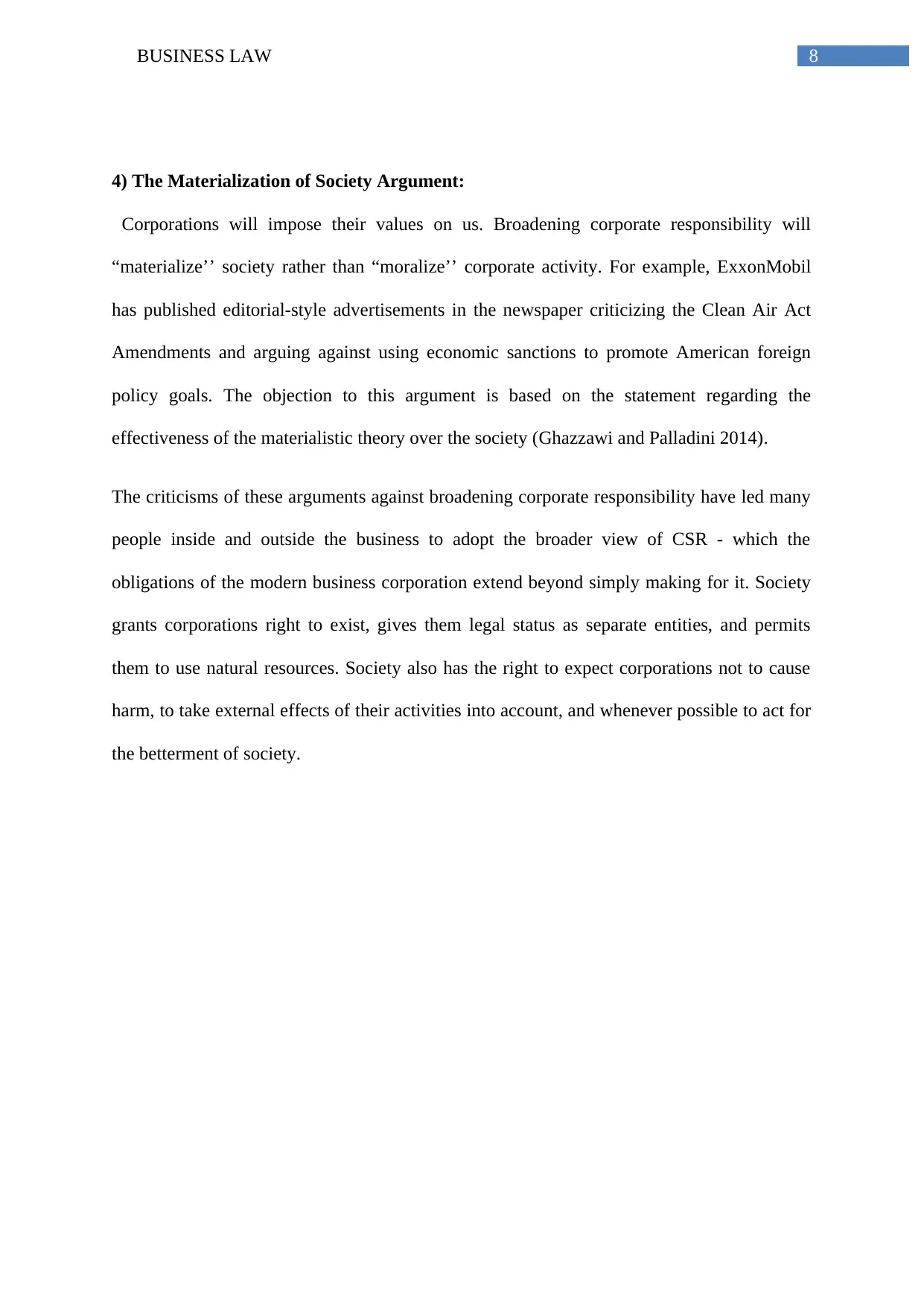
8BUSINESS LAW
4) The Materialization of Society Argument:
Corporations will impose their values on us. Broadening corporate responsibility will
“materialize’’ society rather than “moralize’’ corporate activity. For example, ExxonMobil
has published editorial-style advertisements in the newspaper criticizing the Clean Air Act
Amendments and arguing against using economic sanctions to promote American foreign
policy goals. The objection to this argument is based on the statement regarding the
effectiveness of the materialistic theory over the society (Ghazzawi and Palladini 2014).
The criticisms of these arguments against broadening corporate responsibility have led many
people inside and outside the business to adopt the broader view of CSR - which the
obligations of the modern business corporation extend beyond simply making for it. Society
grants corporations right to exist, gives them legal status as separate entities, and permits
them to use natural resources. Society also has the right to expect corporations not to cause
harm, to take external effects of their activities into account, and whenever possible to act for
the betterment of society.
4) The Materialization of Society Argument:
Corporations will impose their values on us. Broadening corporate responsibility will
“materialize’’ society rather than “moralize’’ corporate activity. For example, ExxonMobil
has published editorial-style advertisements in the newspaper criticizing the Clean Air Act
Amendments and arguing against using economic sanctions to promote American foreign
policy goals. The objection to this argument is based on the statement regarding the
effectiveness of the materialistic theory over the society (Ghazzawi and Palladini 2014).
The criticisms of these arguments against broadening corporate responsibility have led many
people inside and outside the business to adopt the broader view of CSR - which the
obligations of the modern business corporation extend beyond simply making for it. Society
grants corporations right to exist, gives them legal status as separate entities, and permits
them to use natural resources. Society also has the right to expect corporations not to cause
harm, to take external effects of their activities into account, and whenever possible to act for
the betterment of society.
⊘ This is a preview!⊘
Do you want full access?
Subscribe today to unlock all pages.

Trusted by 1+ million students worldwide
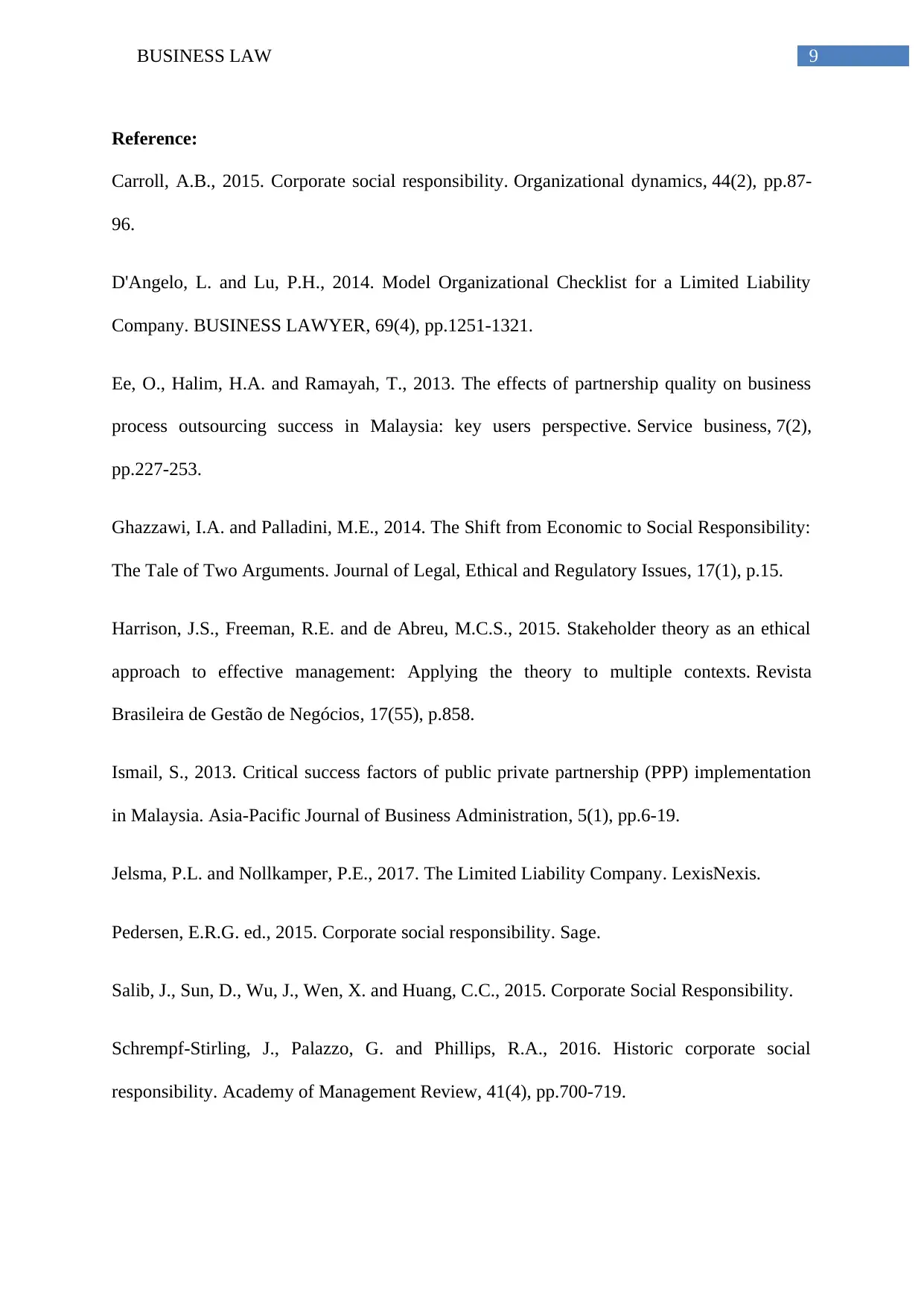
9BUSINESS LAW
Reference:
Carroll, A.B., 2015. Corporate social responsibility. Organizational dynamics, 44(2), pp.87-
96.
D'Angelo, L. and Lu, P.H., 2014. Model Organizational Checklist for a Limited Liability
Company. BUSINESS LAWYER, 69(4), pp.1251-1321.
Ee, O., Halim, H.A. and Ramayah, T., 2013. The effects of partnership quality on business
process outsourcing success in Malaysia: key users perspective. Service business, 7(2),
pp.227-253.
Ghazzawi, I.A. and Palladini, M.E., 2014. The Shift from Economic to Social Responsibility:
The Tale of Two Arguments. Journal of Legal, Ethical and Regulatory Issues, 17(1), p.15.
Harrison, J.S., Freeman, R.E. and de Abreu, M.C.S., 2015. Stakeholder theory as an ethical
approach to effective management: Applying the theory to multiple contexts. Revista
Brasileira de Gestão de Negócios, 17(55), p.858.
Ismail, S., 2013. Critical success factors of public private partnership (PPP) implementation
in Malaysia. Asia-Pacific Journal of Business Administration, 5(1), pp.6-19.
Jelsma, P.L. and Nollkamper, P.E., 2017. The Limited Liability Company. LexisNexis.
Pedersen, E.R.G. ed., 2015. Corporate social responsibility. Sage.
Salib, J., Sun, D., Wu, J., Wen, X. and Huang, C.C., 2015. Corporate Social Responsibility.
Schrempf-Stirling, J., Palazzo, G. and Phillips, R.A., 2016. Historic corporate social
responsibility. Academy of Management Review, 41(4), pp.700-719.
Reference:
Carroll, A.B., 2015. Corporate social responsibility. Organizational dynamics, 44(2), pp.87-
96.
D'Angelo, L. and Lu, P.H., 2014. Model Organizational Checklist for a Limited Liability
Company. BUSINESS LAWYER, 69(4), pp.1251-1321.
Ee, O., Halim, H.A. and Ramayah, T., 2013. The effects of partnership quality on business
process outsourcing success in Malaysia: key users perspective. Service business, 7(2),
pp.227-253.
Ghazzawi, I.A. and Palladini, M.E., 2014. The Shift from Economic to Social Responsibility:
The Tale of Two Arguments. Journal of Legal, Ethical and Regulatory Issues, 17(1), p.15.
Harrison, J.S., Freeman, R.E. and de Abreu, M.C.S., 2015. Stakeholder theory as an ethical
approach to effective management: Applying the theory to multiple contexts. Revista
Brasileira de Gestão de Negócios, 17(55), p.858.
Ismail, S., 2013. Critical success factors of public private partnership (PPP) implementation
in Malaysia. Asia-Pacific Journal of Business Administration, 5(1), pp.6-19.
Jelsma, P.L. and Nollkamper, P.E., 2017. The Limited Liability Company. LexisNexis.
Pedersen, E.R.G. ed., 2015. Corporate social responsibility. Sage.
Salib, J., Sun, D., Wu, J., Wen, X. and Huang, C.C., 2015. Corporate Social Responsibility.
Schrempf-Stirling, J., Palazzo, G. and Phillips, R.A., 2016. Historic corporate social
responsibility. Academy of Management Review, 41(4), pp.700-719.
Paraphrase This Document
Need a fresh take? Get an instant paraphrase of this document with our AI Paraphraser
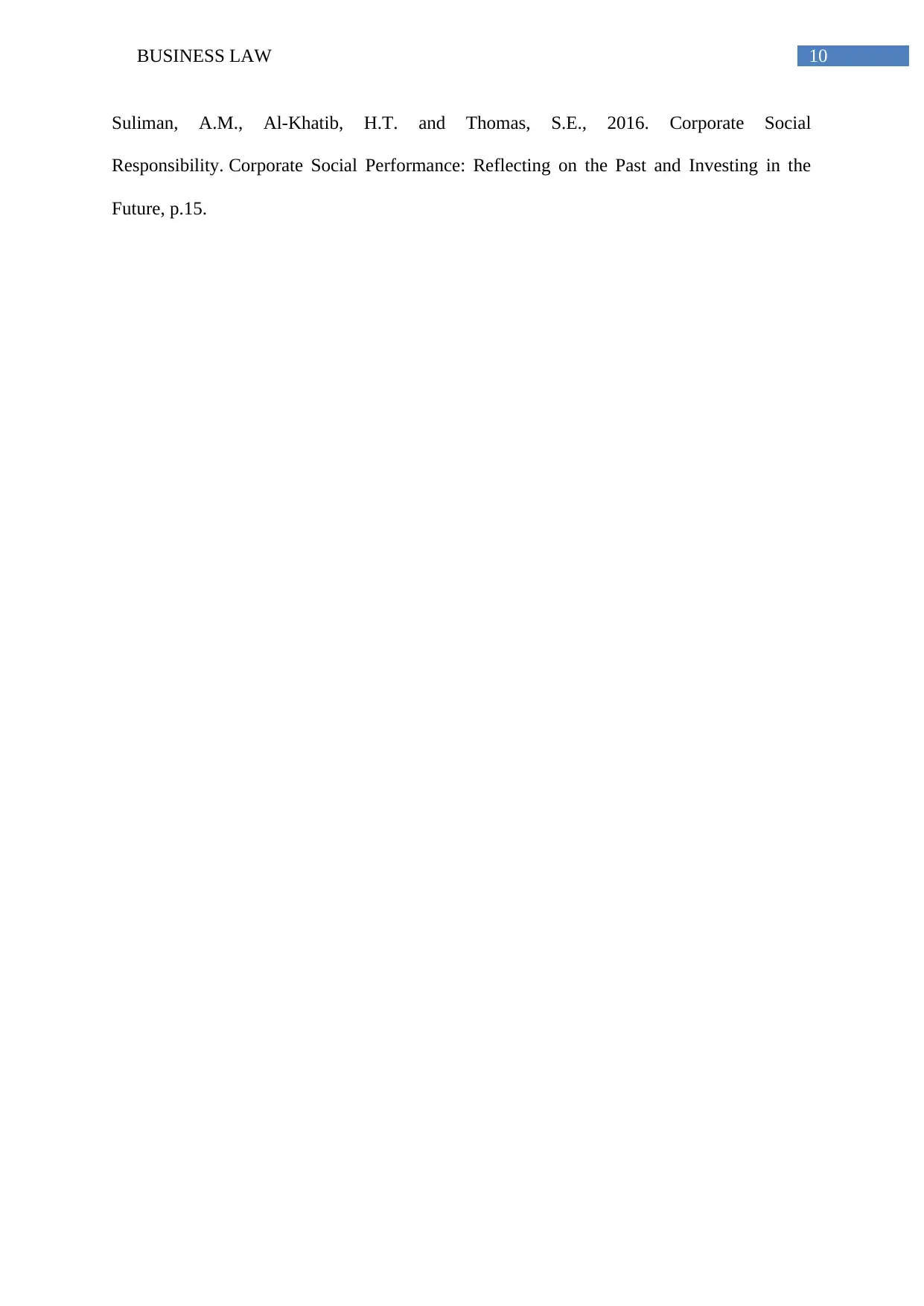
10BUSINESS LAW
Suliman, A.M., Al-Khatib, H.T. and Thomas, S.E., 2016. Corporate Social
Responsibility. Corporate Social Performance: Reflecting on the Past and Investing in the
Future, p.15.
Suliman, A.M., Al-Khatib, H.T. and Thomas, S.E., 2016. Corporate Social
Responsibility. Corporate Social Performance: Reflecting on the Past and Investing in the
Future, p.15.
1 out of 11
Related Documents
Your All-in-One AI-Powered Toolkit for Academic Success.
+13062052269
info@desklib.com
Available 24*7 on WhatsApp / Email
![[object Object]](/_next/static/media/star-bottom.7253800d.svg)
Unlock your academic potential
Copyright © 2020–2025 A2Z Services. All Rights Reserved. Developed and managed by ZUCOL.




